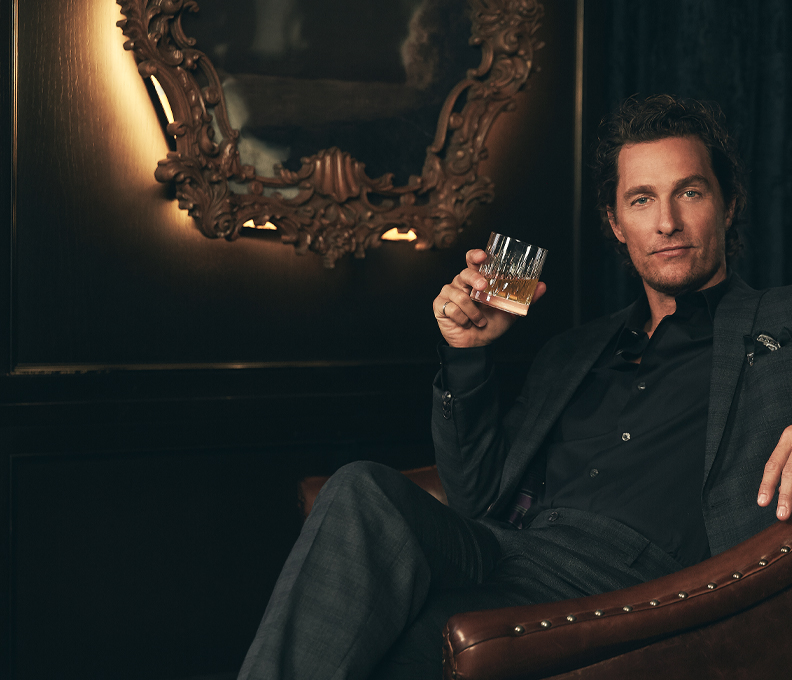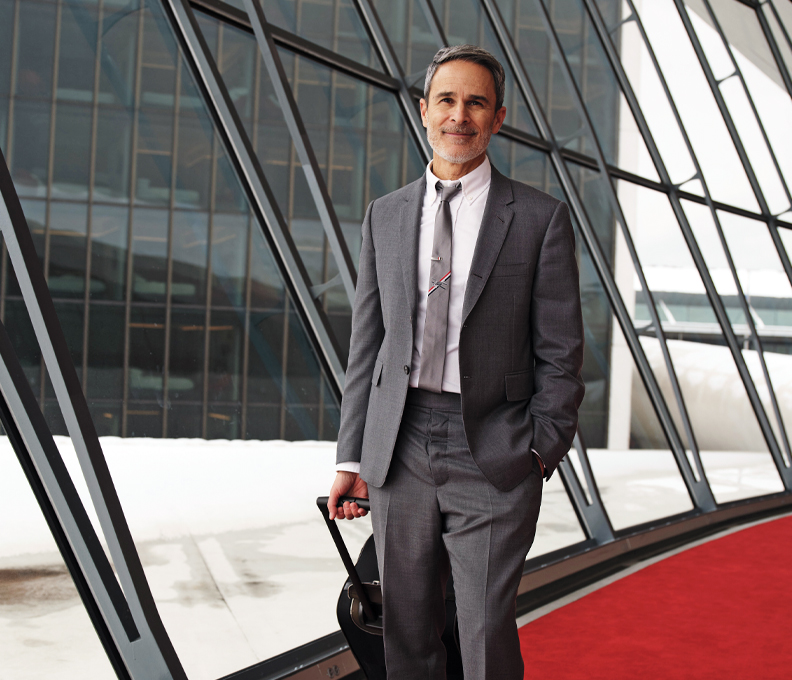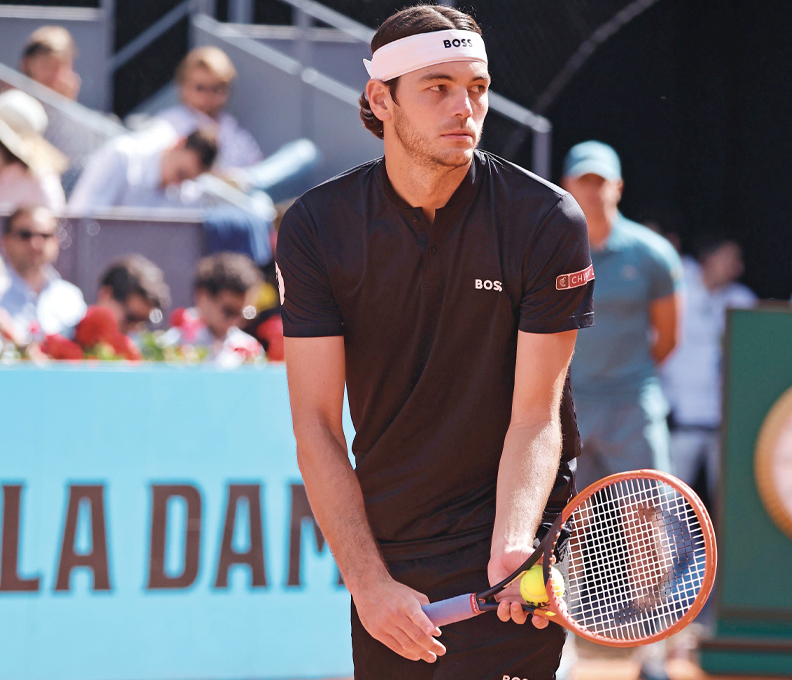Basketball Star Kyle Kuzma Is Investing in the Future
The athlete excels at shooting three-pointers, but he’s aiming much higher and deeper in his personal life
by Alix Sharkey
September 1, 2023
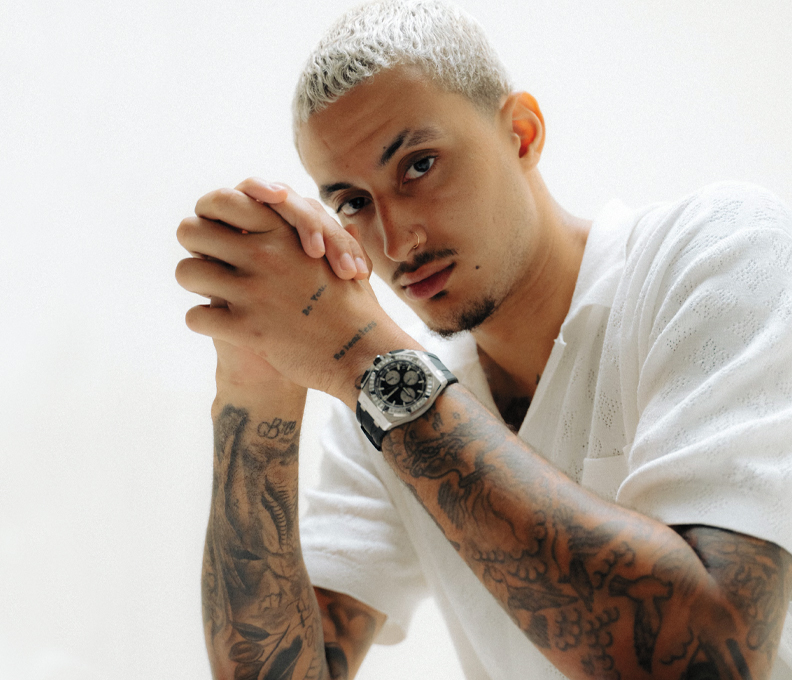
Kyle Kuzma / Photo: Courtesy of Mike Cummings
It has been almost two years since Kyle Kuzma rocked a look so hard that it broke the Internet and rattled not just the NBA, but also the fashion world at large. As he strolled down the pregame tunnel to the Washington Wizards’ locker room, Kuzma was swathed in a bubblegum-pink cable-knit Raf Simons sweater that reached mid-thigh on his black pants, with sleeves so long they swung against his calves.
The look went viral in dozens of memes mocking the sweater as “ridiculous.” But a lot of people sat up and took notice. Corporate marketing people, for example. Here was an elite pro athlete willing to push beyond the conservative dress choices for American sportsmen and turn the tunnel into a fashion runway.
Kuzma was unfazed by the reaction. He knew exactly what kind of effect he’d achieve. “That pink sweater is an art piece,” he says. “It will live forever.”
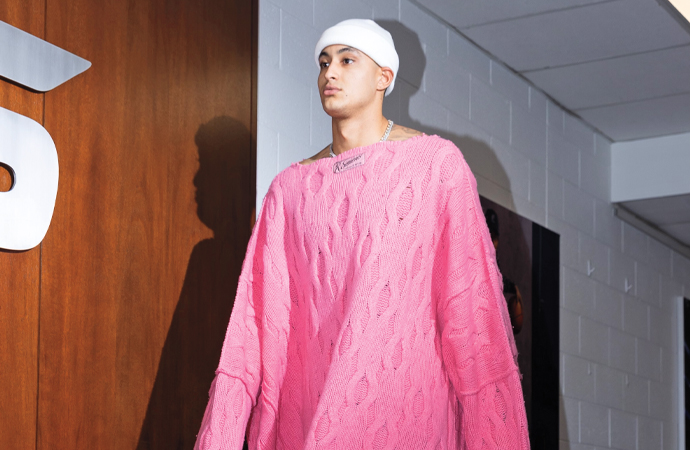
Kyle Kuzma / Photo: Courtesy of Washington Wizards
In fact, the 28-year-old power forward already had a reputation for bold wardrobe choices, dating back to his rookie season with the L.A. Lakers in 2017. In April, NBC Sports Washington even ran a two-minute video compilation of his best outfits from the 2022-23 season—knit shorts and sweater twinset in Japan, black silk puffer with oversized snood in Brooklyn, pink striped balaclava and contrast knit cardigan in Washington. Last fall, Kuzma walked the runway in Puma’s Futrograde presentation during New York Fashion Week in a sequined black basketball jersey over a black hoodie, with a floor-length black skirt sewn from several puffer jackets.
“He wants to be the greatest in this arena,” says his stylist, Toreno Winn, Jr. “He’s going to make his mark in the fashion space.”
All this seems a long way from the hardscrabble streets of Flint, Michigan, where Kuzma was born and raised. Since the late 2000s—that is, for most of his early life into his teens—Flint has consistently ranked among America’s most dangerous cities: From 2010 to 2012, it had the highest violent-crime rate of any city of more than 100,000 people. Predictably for a deindustrialized region where 35.5 percent of its citizens still live under the poverty line, drugs have long played a significant part in the local economy. But Kuzma was never tempted to get “into the streets,” as he calls it.
“I never was a bad kid, although I had all types of friends, some from bad neighborhoods. But for me, it was about not wanting to disappoint my mother. So I had that fear of not wanting to let her down. That kept me away from the negative stuff going on around me. And also, I always wanted a lot more for myself, something better than the streets could offer.”
It’s not hard to understand Kuzma’s deep bond with his mom, Karri. After dropping out of college when she became pregnant with Kyle, she put in a heroic effort to raise him, initially as a single mother. And as a high-school athlete herself—excelling at varsity basketball, volleyball, shot put and discus—Karri provided the solid support, advice and encouragement her son needed during his formative years.
Even though the family moved around a lot, basketball was ever present in young Kyle’s life. And thanks to YouTube, he was able to research the legends that older players talked about.
“As a kid,” he says, “I would watch highlights online of the best basketball players of all time. So of course you’ve got Michael Jordan, whose story was inspirational because he had so many early challenges. And I’d watch Larry Bird and Magic Johnson and so forth. Later of course it was Kobe and LeBron. All of them fed my passion for basketball. But then there were other people like Dwayne ‘the Rock’ Johnson and watching MTV Cribs, and I could just kind of imagine living that life. I knew what I wanted, so I worked hard.”
Countless hours on the court at Flint’s YMCA, refining his shooting technique and playing to the point of exhaustion, finally paid off when Kuzma earned a basketball scholarship to The University of Utah. By the time he’d earned his sociology degree, interest from NBA teams had exploded. Kuzma entered the NBA draft and was drafted by the Brooklyn Nets—who traded him to the Lakers. Kuzma was stoked. “It’s probably the biggest brand in basketball.” And how did it make him feel to go from watching LeBron James on YouTube to playing with him on the same Lakers team?
“Crazy, 100 percent crazy. Growing up as a fan, watching his moves, and then his amazing longevity allowed me the chance to play alongside him on the same team? And to learn from him directly? I mentioned to him I’d been a fan growing up, but man, he’s been at the top so long he must have heard that dozens of times. Younger players, nine out of ten times they grew up trying to copy his moves.”
Selected for the NBA All-Rookie Team at the end of his first season, Kuzma became an increasingly influential player, and eventually an NBA champion as the Lakers beat the Miami Heat 4-2 in the 2020 finals. Then, in August 2021, he was traded to the Washington Wizards as part of a player package in exchange for veteran point guard Russell Westbrook.
“A year after winning the championship, I had a rough playoff series. I didn’t play to my capabilities, and being traded—that was like a crossroads in my life. You know, to have this goal ever since you were a child, then to win an NBA championship, and to achieve that goal and then find yourself traded, that’s…an interesting feeling.”
Did it feel like a demotion? “Yeah, it felt a bit like that, it was an emotional time. It felt like not being valued. So that was a real crossroads for me, after being at a high-pressure organization for four years and having some real success, and then coming to a completely new team, a new city. I had to really draw on my self-confidence. I had to remind myself who I was as a person, and all the work I’d done just to get to this position. I had to believe in myself, to remember that yeah, I am very good at what I do. It was a lot of self-belief.” The consensus is that Kuzma has actually improved since joining the Wizards, and had a breakout season in 2022-23, with his average points and assists reaching a career best on a per-game basis.
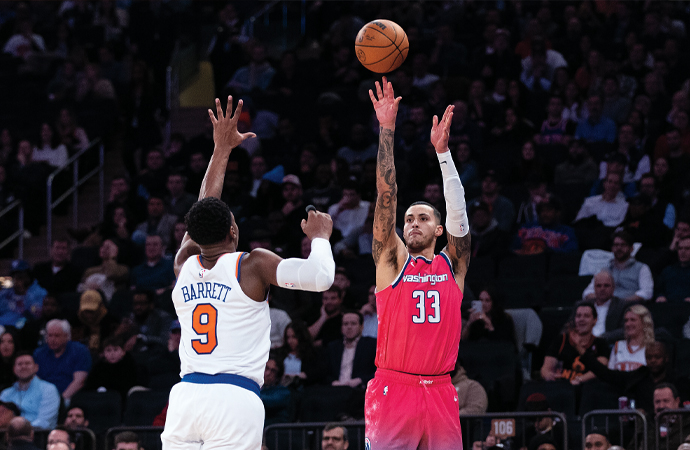
Kyle Kuzma shooting a jump shot in a Washington Wizards victory against the New York Knicks, January 2023 / Photo: Dustin Satloff/Getty Images
Last June, Kuzma became a free agent. Ten days later, he agreed to a four-year, $102 million deal to remain with the Wizards. “I really like D.C.,” says Kuzma. “I like the culture and the architecture, as well as the fans. It reminds me of Paris.”
The Wizards are currently in a rebuilding phase with a younger core of players, many of them 22 or 24 years old such as Deni Avdija and Daniel Gafford, and 19-year-old Bilal Coulibaly. And everyone seems to agree on one thing: Kuzma’s role will be crucial. A vocal leader on and off the court, Kuzma can score, pass, rebound. And he’s been there and done it. How does he feel about this new role?
“Everybody knows I’m a very ambitious person, so having this opportunity to lead this organization, this bunch of young guys, is something I believe I can do at a high level. I’m just very excited to build something with them.”
Off the court, apart from being a style icon, Kuzma is also an entrepreneur, and in 2021 launched an all-natural hydration beverage called Barcode with cofounder Mubarak Malik. He describes it as “a performance drink with clean ingredients like coconut water, with added various adaptogens, vitamins and minerals, stuff that’s really valuable to the human body. And of course, there’s no added sugar.”
What was the inspiration? “As you can imagine, as an NBA athlete I have to be very aware of my lifestyle and especially my nutritional standards. I’m very conscious about what I eat and drink, and I have to focus on the stuff that gives me essential nutrients and optimal energy. We set out to create a beverage that enhances mood, bolsters immunity, accelerates recovery and boosts performance.”
How does he decide which products to develop and support? “It’s got to be something that I believe in, something that I think is useful and original. When I consider any kind of business deal, it has to be a genuine connection, too. It can’t be just for a paycheck. I want to find my own way to add value to the brand.”
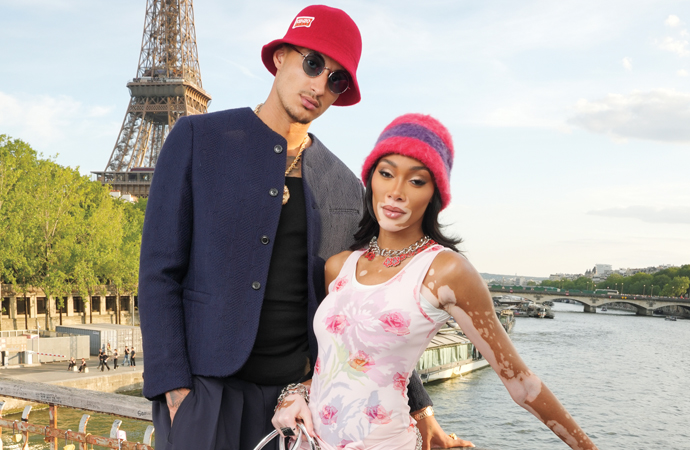
With girlfriend Winnie Harlow in Paris / Photo: Swan Gallet/WWD via Getty Images
Then there’s his fashion line, Childhood Dreams. “I make sketches, I’m very visual, and I talk with the production and design managers to get the ideas out of my head and onto the drawing board. I worked with them on the colorways and fabrics, and went to the fabric store and the factory to help develop the prototypes. I’m a very hands-on person. If I get involved in something, I get in deep.” Last year, he collaborated with Puma to create a cobranded collection.
“I’ve always had the mindset of look good, feel good, play good. And there’s a definite crossover between my attitude to basketball and fashion. I believe if you work hard, you can make progress, and if you’re truly dedicated you can achieve great things. I have friends in fashion, designers who’ve asked me to walk in fashion shows, and when I’ve done that it’s because I know the work, the designs are relevant and talking to now.
“With Puma we wanted to tell a story,” he continues. “We focused on the idea that we need to make our clothing more sustainable in our world today, with global warming and climate change going on. We were trying to represent a different attitude, to show that we could make dope styles with an ecological mindset.”
But how does he juggle these business interests with his career as an NBA player? “I’m very fortunate that one of my mentors in life,” says Kuzma, “was Kobe Bryant. I’ll never forget, I went to dinner with him one evening and I asked him a similar question, how he managed to balance all the various business and entrepreneurial things he had going on, and Kobe told me, ‘You gotta keep the main thing the main thing. If you do that, everything else you want in life will come to you. You have to have that solid foundation, otherwise you’re going to fail.’ And I’ve always kept that advice close to heart. I have a lot of interests: I’m interested in being an entrepreneur, I’m interested in fashion, in art, in nutrition, and a lot of businesses and enterprises out there are trying to talk to me about various opportunities and proposals. But you gotta keep the main thing the main thing, and never lose that focus.”
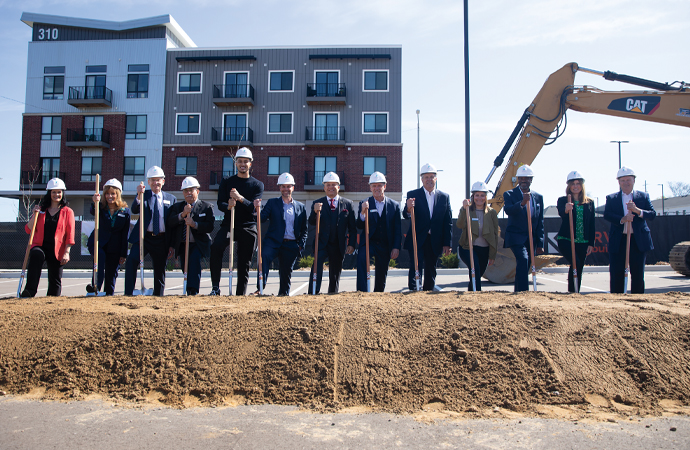
At a dedication for the YMCA in Flint, Michigan / Photo; Courtesy of YMCA of Greater Flint
Recently, his nonprofit Kyle Kuzma Foundation donated $1 million to the YMCA in Flint, Michigan. What prompted that donation?
“I remember taking the bus to the Y and practicing there for hours and hours, and it was my safe place, my happy haven. And that was my springboard to a career in the NBA, so it’s only right that I try to pay that back, try to help young kids coming through now.”
Might Flint eventually produce another Kyle Kuzma? “Let’s put it this way,” he says. “I was in Napa recently visiting a winery, and one of the winemakers said he’d just planted some new vines. And he told me, ‘You know these grapes I’m laying right now? I’ll probably never get to taste them.’ He was investing in the future, knowing it would be decades before the vines were mature enough to make great wine. That’s the kind of generational impact I’m hoping to have.”
